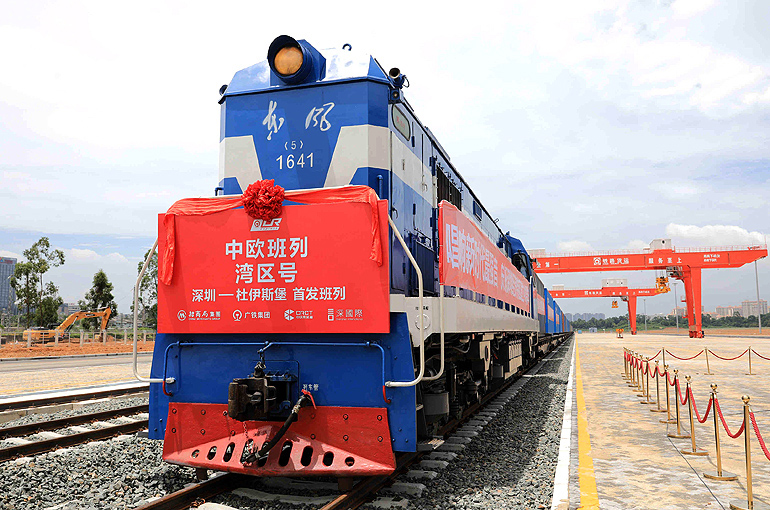 Nearly 13 Years of China-Europe Express Rail Link Underscores BRI’s Wins
Nearly 13 Years of China-Europe Express Rail Link Underscores BRI’s Wins(Yicai) Oct. 16 -- The China-Europe Railway Express, the container shipping alternative also known as the Silk Road Railway, has chalked up more than 78,000 journeys over the 12 and half years that it has been running, becoming a flagship of China’s Belt and Road Initiative.
As of Sept. 30, freight trains on the link have moved in excess of 7.4 million twenty-feet equivalent units of goods since it opened in March 2011, according to the latest data from the National Railway Administration.
The China-Europe Railway Express has become an important plank of the BRI, a modern interpretation of the ancient Silk Road that aims to enhance trade and connectivity between China and Europe, as well as other regions along the route. This year mark the BRI’s 10th anniversary.
With a maximum speed of 120 kilometers per hour, the China-Europe Railway links up 112 Chinese cities, and passes through over 100 cities in Central and West Asia on its way to Europe, giving access to 217 cities in 25 European nations, the State Council Information Office announced last week.
The corridor accounted for 8 percent of all goods transported between China and Europe last year, up from 1.5 percent in 2016, according to the NRA. As of June 30, more than USD300 billion worth of goods had been delivered by cargo train, involving over 50,000 different types of product in 50 major categories such as finished vehicles, mechanical equipment, and electronics.
When the new route was launched, Chongqing was the first and only stop in China, Yang Jie, general manager of a China-Europe freight forwarder in Shanghai, told Yicai. Now the network spans a number of Chinese cities that have import and export resources, becoming one of the nation’s most noticeable foreign trade channels, Yang added.
The channel has evolved from the early days of offering customized charters for specific customers to providing regular services for domestic and overseas clients, and the variety of goods transported has proliferated, Yang added.
The network is unparalleled. For example, the 13,900-kilometer route between Yiwu, a city known for its massive small commodities market, and Madrid in Spain is the world's longest fixed freight train route with a duration of about 21 days. It was launched in 2014.
Traffic is increasing as the Shanghai-Europe route, which was launched in September 2021, added another destination on Oct. 9 when the first train to Munich departed from the eastern Chinese city. The route already operates regular trips from the financial hub to Hamburg, Moscow, Marashevich in Poland, and Altynkol in Kazakhstan, a person at its operator told Yicai.
The network is still expanding, Yang told Yicai. The development plan for the next three to five years has new targets such as fresh tracks to Central Asia, Vietnam, Laos, and Thailand, which would certainly boost freight connectivity between these countries and regions with China as well as Europe.
In addition, China will make more active international cooperation efforts regarding the improvement of the Trans-Caspian Corridor, a Central Asian alternative to the Trans-Siberian Railway to go to Europe, to fine-tune its southern channel, Yang concluded.
Editors: Tang Shihua, Emmi Laine